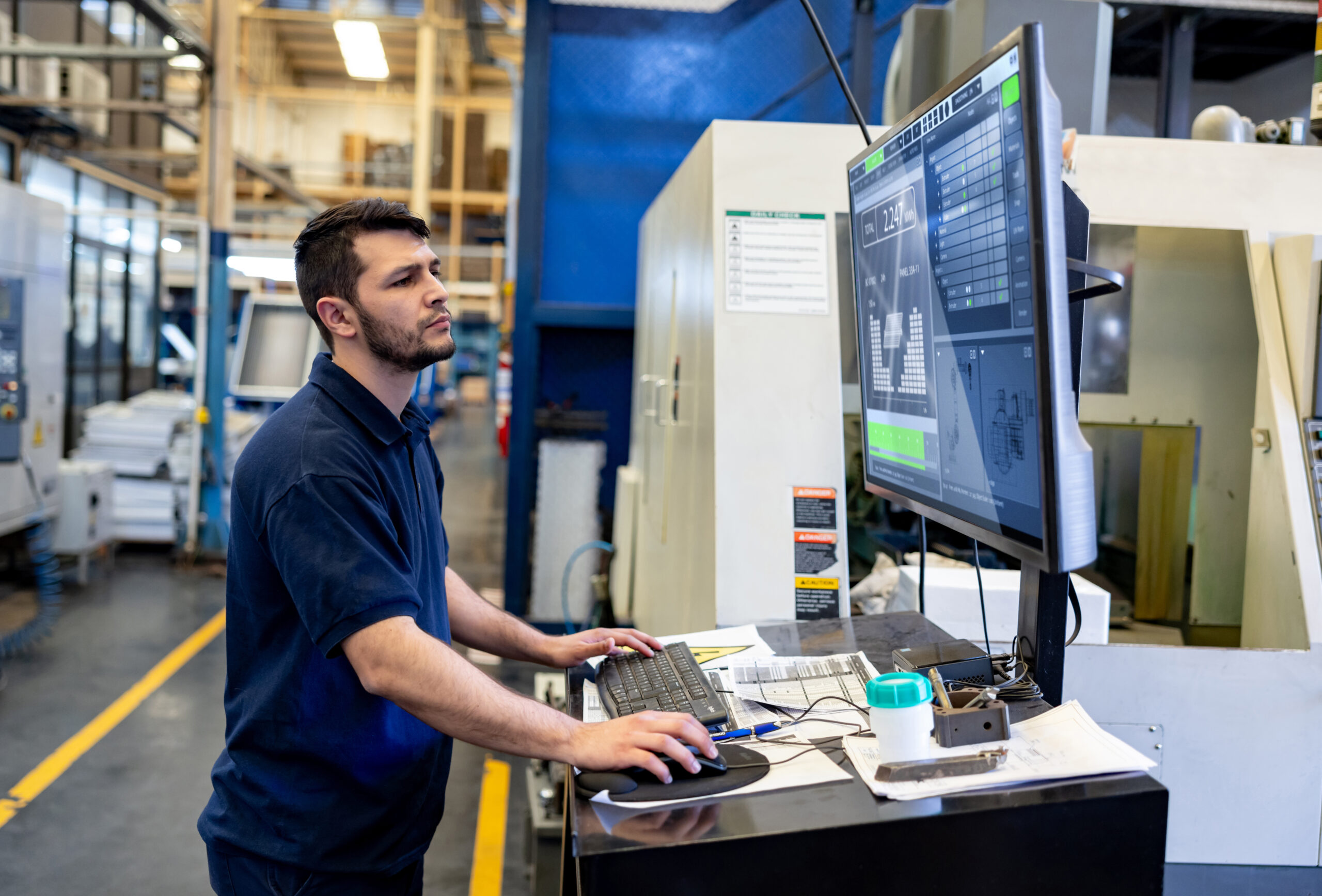
All too often, manufacturers use different systems for every task in their shop. One system will be used for creating bills of materials, while a different system will be used for managing inventory, yet another for shop floor scheduling, another for accounting, and so on and so on. Several spreadsheets will probably also be included in the mix.
Manufacturing companies that handle their various business tasks with separate systems are more prone to run into problems like disconnected departments, information silos, data inaccuracies, duplication of tasks or records, and poor communication. This makes it challenging to run a shop smoothly and successfully: Due to the need to reconcile data manually between systems, redundant processes will result in lower efficiency and higher costs.
ERP: The All-in-One Solution
An ERP solution integrates all manufacturing and business activities into a single framework to ensure efficiency.
ERPs allow manufacturers to handle all of their many business and operational activities from a single interface; everything from production, accounting, shipping, and finance, to scheduling and so much more, is all integrated into one system. This allows manufacturers to:
- Save time and money by combining many business tasks into one system
- Automate key business activities
- Lower operating expenses through improved inventory and production management
- Streamline data collection, reconciliation, and analysis
- Analyze performance in real-time to improve manufacturing methods and increase competitiveness
Top 5 Reasons Why All Manufacturers Need an ERP System
1. Improve Productivity
If your shop is out of sync, problems will quickly start to arise. These can include everything from not reacting quickly enough to significant market changes to operational hiccups that reduce productivity and profitability.
Getting an ERP is the best way to raise productivity in your shop. ERPs enable manufacturers to improve operations by combining their data and processes into one system. ERPs assist your business in streamlining financial processes, improving operations, managing schedules, reducing errors, producing real-time data, and ensuring timely communication throughout your business.
For your business to operate successfully, management and operations need to coordinate closely to ensure that your business is operating as efficiently as possible — however, figuring out how to increase efficiency and optimize operations is time-consuming. Modern, industry-specific ERP systems provide unparalleled access to data and easily facilitate collaboration across your operation.
Modern ERP solutions accelerate coordination and communication by giving you one unified system that everyone within your business can access (when given appropriate access rights, of course). By making your data available to those who need it, your manufacturing company will be able to save money and time as you will have a comprehensive view of your entire operation, allowing you to quickly find improvements and eliminate redundancies.
2. Automate Business Processes
ERPs provide manufacturers with real-time data — all housed in a single location — enabling businesses to automate and optimize all of their business procedures.
ERPs are the easiest way for manufacturers to start automating key business processes, saving time and money, and freeing your staff to focus on core tasks and activities. For example, manufacturers used to have to rely on manually-created paper-based schedules. But with the advancement of ERPS and real-time data, manufacturers now have access to accurate and reliable schedules created by their ERP system. These schedules reduce the likelihood of errors, speed up operations, and increase profitability. With the capacity to oversee and allocate tasks to workers, ERP can produce optimized productivity — requiring little to no human oversight or intervention.
ERPs can also anticipate and complete order requests, know when and how to purchase and manage raw resources, and improve supply chain management by automating and organizing the flow of information between suppliers, manufacturers, and distributors.
Improved automation is one of the main advantages of modern ERP systems. By streamlining procedures, automating time-consuming tasks, and facilitating quick decisions, ERPs enhance customer experiences and increase profitability. ERPs also allow manufacturing companies to be in a better position to implement new automation technologies like IIoT, letting them stay ahead of their competition. Modern cloud-based ERPs raise the bar for automation by making it simpler to gather and automatically act on data.
3. Easy Reporting and Forecasting
A good ERP system will come with a wide variety of beneficial and simple-to-understand analytical tools and enable you to run reports easily. These tools and reports help you to collect, analyze, and organize your data to give you a complete picture of your business. The insights from your reports can help to drive change and eliminate inefficiencies across your shop. Analytics of your manufacturing processes can help to improve machine performance, identify bottlenecks, reduce scrap rates, and improve throughput — to maximize productivity and increase profitability.
For example, instead of relying on sifting through spreadsheets and manually creating reports, your staff can quickly generate accurate and current reports to assist with planning and demand forecasting. By generating sales information and making accurate forecasts based on previous inventory movement, you can plan better and avoid stock emergencies.
4. Better Decision Making
To ensure that your organization makes the best decisions possible, you must have access to precise and trustworthy data. The best way to achieve this is to invest in a quality ERP system that will give you up-to-date and real-time information and allow you to gather and analyze all the necessary data in one place. The enhanced insight, control, and visibility provided by your ERP to the decision-making team within your organization results in better decision-making.
For example, responding to market changes is time-consuming and affects numerous operational areas within your organization. An ERP system aids in the process by enabling senior management and operation managers to assess and gauge the efficacy of any potential process and system modifications. Each operational adjustment greatly decreases associated costs and risks, resulting in a better success rate. ERPs give you accurate data, facts, and information that support your decision-making and help steer your business in the right direction. You will be able to leverage the real-time data and visibility a modern ERP system provides you to assess your operations and guide planning more strategically.
RELATED ARTICLE: Why Manufacturers Need Business Intelligence Now More Than Ever
5. Reduce Costs
Looking for potential cost savings is always a major factor in selecting a new ERP solution by a manufacturing business.
When you adopt a new ERP, you gain real-time data on your business’s daily activities, which lowers administrative and operational costs.
ERPs optimize business processes and reduce costs by giving you real-time data and insights into your organization and allowing you to automate manual and time-consuming activities. For example, over time, as you use your ERP system to manage inventory, you’ll notice less excess inventory, improved inventory tracking, and lower warehousing costs.
ERPs also help you make critical decisions on how to best use personnel, inventory, and equipment to reduce waste, resulting in significant financial savings.
Labor costs are some of the highest expenses for a manufacturing business. To better control labor costs, you need to manage your shop better — meaning you need to become more efficient and better allocate time and resources. An ERP system is one of the best ways to get on top of your labor costs. An ERP can help you on many different levels, making you more productive and efficient, and helping you keep your labor costs under control.
Conclusion
Every manufacturing company can benefit from an ERP. ERPs are just the tool you need to improve your shop: a fully integrated system that will help you manage every aspect of your business.
To learn more about how a manufacturing business can benefit from an ERP, check out Genius ERP’s Virtual Tour.
Get your eBook Scared to implement a new ERP?
"*" indicates required fields



